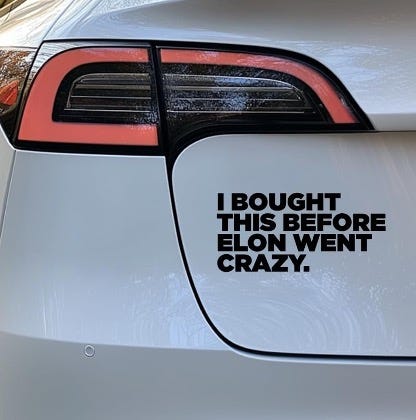I'd say my views on customer loyalty are pretty well known by now. But the other day, I got asked a great question which made me think again.
I've written about it, spoken about it, and taken part in a very odd but quite fun debate about it. However in case you don’t know, I don’t think customer loyalty exists.
People might stay because they like the offer, because the brand represents something about them, or because they have deep inertia and just stay where they are.
But these things aren't loyalty. If a product gets worse or service becomes rubbish or price rises dramatically or brand becomes unappealing, customers will head to the nearest competitor or alternative that does the job instead.
Two weeks ago though, at a presentation, someone asked me a great question:
‘So loyalty might not be a reason why you’d buy. But could loyalty be a reason you wouldn’t buy?’
The example the questioner gave was the tribalism and rivalry of Xbox and PlayStation, which probably reached it’s peak in the mid-2010s. You were one or the other, sometimes literally wearing the badge on your clothes to show your allegiance.
His point was that the tribalism ran so deep that it wasn’t really the fact you were loyal to Xbox that made you keep buying; it was that you were so anti-PlayStation that you’d never even consider buying one of their products. That’s just not something you’d associate with, it wasn’t who you were.
It reminded me of a similar situation a decade before, when it was fashionable for mobile phone companies to sponsor football teams.
My club, Arsenal, had the O2 logo emblazoned across their shirts. Manchester United, however, opted for Vodafone as their sponsor. Not only did it mean there was a slightly strange secondary competition happening, but, by all accounts, the sale of new Vodafone contracts in north London fell through the floor as Arsenal fans refused to be associated with their great rival’s sponsor.
Did I care which mobile phone company I went with? Not hugely, although O2 did give Arsenal fans a good offer. But did I care about which company I didn’t go with? Absolutely. O2, Orange, T-Mobile, all fine. Vodafone? I’d never live it down.
Which brings us to today, and brings us to Tesla.
A few years ago, there were some very good reasons to buy a Tesla. Maybe you cared about the environment. Maybe, you wanted to be seen on the cutting edge of technology. Maybe the smooth drive (albeit Jeremy Clarkson may disagree about that)
All of those reasons are as true now as they were then. But the narrative has changed.
Because rather than people now talking about why they would buy a Tesla, people are actively talking about why they wouldn’t.
Their loyalty to good working practices. Their loyalty to diversity and inclusion, Their loyalty to, oh I don’t know, the very foundations of human decency.
People’s loyalty to their friends, family community, culture an beliefs are driving their decisions to not buy something, particularly across Europe. Can’t think why.
In a sense, this may be an obvious point to make: people won’t buy things from organisations which are in direct conflict to their deeply held beliefs.
But I think it matters, as it demonstrates what loyalty really is, what it really looks like when you see it in action. It’s no staying with a company because it’s easier than leaving. It’s not staying because you get a free coffee with every nine that you buy.
It’s a deep, emotional connection to something and someone, that drives your decisions, and dictates what you won’t do, what you would never do. And once you get to the point of being in that bracket for people, it’s very hard to come back from.
Because a 20% discount isn’t going to make up for destroying a democracy.
(Thanks to Steph Jones for the provocation on this one)





